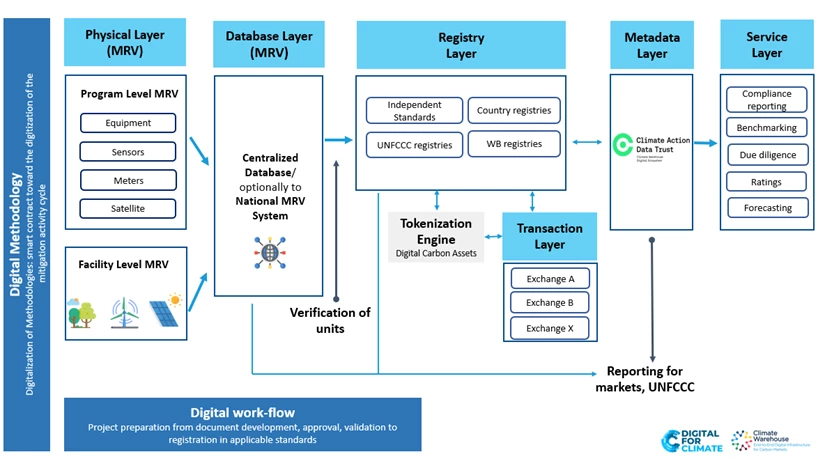 3D futuristic computer circuit
3D futuristic computer circuit
The need for enabling tools to mobilize finance for the low-carbon transition is urgent. Carbon markets have strong potential to unlock finance to achieve climate goals, and they could save an estimated $250 billion per year in implementing climate actions by 2030. However, transactions in carbon markets will only reduce greenhouse gas (GHG) emissions globally if these reductions are real and credible, and accurately accounted and tracked.
Transparency and accountability are therefore critical to a well-functioning carbon market. While the bottom-up nature of the Paris Agreement gives flexibility to countries in managing and tracking their climate action, there is no guidance on how to connect disparate registry systems -- databases that register and/or transact emissions reductions units -- which poses a serious challenge to ensuring transparency and trust in the market. In addition, this bottom-up approach has given rise to a variety of methods for reporting and verifying GHG emissions reductions. As a result, more heterogenous and fragmented climate markets could evolve with different governance rules and technological systems across the carbon market value chain. In this environment, accurately tracking global GHG emissions reductions could be a challenge.
"Carbon markets have strong potential to unlock finance to achieve climate goals, and they could save an estimated $250 billion per year in implementing climate actions by 2030."
Data infrastructure plays a crucial role in building transparency and trust
A common data system is needed to collect and structure all openly accessible data on the lifecycle of carbon credits to enhance transparency, trust, and integrity. Such a system could enable the scale-up of carbon markets and act as an aggregating force in the overall ecosystem, bringing together real-time, comparable, and auditable emissions reductions data from disparate registry systems across the world. This infrastructure also could have the potential to unleash private sector innovation to deliver services needed for the market to grow -- such as forecasting, ratings, due diligence checks, compliance reporting and certifications.
To this end, the World Bank’s Climate Warehouse program, the Government of Singapore, and the International Emissions Trading Association (IETA) developed the Climate Action Data Trust (CAD Trust) -- a free, open-source global platform that connects, aggregates and harmonizes carbon credit data. Its overarching goal is to support reporting-compliance requirements, enable transparent accounting of carbon, and strengthen the implementation of the nationally determined contributions (NDCs) that sit at the heart of the Paris Agreement.
"The Climate Action Data Trust is a free, open-source global platform that connects, aggregates and harmonizes carbon credit data from project registries to enable transparent accounting of carbon."
Using Blockchain to identify ‘double counting’
The CAD Trust’s open-source data system uses distributed ledger technology -- specifically blockchain technology -- to create an immutable, auditable, and decentralized record of carbon market data. The CAD Trust operational system is leveraging the Chia Network’s Data Layer built on a public and permissionless blockchain technology. The system is designed to connect disparate registries across the world, establishing a peer-to-peer network for sharing data in alignment with the Paris Agreement. In doing so, it will provide critical data that can help identify “double counting” -- when more than one entity claims the same emissions reductions.
Blockchain technology provides both the accountability and transactional efficiency, via smart contracts, to address the increasing diversity of Monitoring, Reporting and Verification (MRV) systems used to measure GHG emissions reductions; and it also helps account for diversity of regulations, climate assets, and values of mitigation outcomes, within and across jurisdictions.
A public blockchain powering the CAD Trust establishes an open ecosystem that allows innovators to interact with the CAD Trust data and build new solutions for the market -- for example, resolving current MRV challenges, establishing transparent carbon credit source-to-sink pathways, and increasing market access for project developers.
Infrastructure tested by governments and organizations
Over three years, the World Bank’s Climate Warehouse program together with the ITS Technology & Innovation Lab trialed the platform in a series of simulation activities that prototyped a metadata infrastructure. Governments and organizations tested how the platform can integrate registry systems in a decentralized approach and provide access to sophisticated and timely registry data. The simulations tested the data model and architecture, and explored multiple blockchain technologies including Ethereum, Hyperledger Fabric platform, Kaleido Blockchain Software and Chia Network.
The third and final simulation developed and tested an operational prototype with 30 carbon market stakeholders, including 11 national governments and 75 testers across 58 testing sessions. Participants included the United Nations Framework Convention on Climate Change, United Nations Development Program, Verra, Gold Standard, American Carbon Registry, Global Carbon Council, Climate Action Reserve, GenZero, as well as the national governments of Chile, Japan, Peru, Rwanda, Senegal, Singapore, Spain, Sweden, Switzerland, United Kingdom, and Uganda.
Climate Action Data Trust initiates operational phase
The CAD Trust was officially launched as an independent entity on December 7, 2022, at the Asia Climate Summit, and is domiciled in Singapore. The CAD Trust is led by a Board and a Council that consists of government representatives and major carbon registries, including those of Bhutan, Chile, Japan, Senegal, Singapore, and the United Kingdom, as well as Verra, Gold Standard, American Carbon Registry and Global Carbon Council. The CAD Trust governing structure includes a Secretariat as well as advisory bodies such as the Technical Committee and the User Forum that will be working towards enhancing and operationalizing the CAD Trust.
The governance model of the CAD Trust was based on the recommendations from stakeholder consultations, co-convened by the World Bank, IETA, and the Government of Singapore, over a 6-month period with 70 entities, including 11 meetings, 4 plenary sessions and 6 focus group meetings. The consultations benefited from participation of diverse groups including governments, independent standards, exchanges, traders, project developers, private sector, financial institutions, technology providers, NGOs, think tanks, law firms, and multilateral development banks among others.
Climate Warehouse: Building an end-to-end digital ecosystem for carbon markets
Opportunities exist to further improve the efficiency and transparency of carbon markets while reducing costs. To that end, the World Bank’s Climate Warehouse program is working with public and private sector partners to build an end-to-end digital ecosystem to underpin the development of post-2020 carbon markets under the Paris Agreement. This initiative builds and pilots modular components of the ecosystem needed to digitize the generation, reporting, and transfer of carbon assets (Figure 1). Further, Climate Warehouse supports countries and jurisdictions through capacity-building programs on how to implement the market infrastructure required for GHG mitigation and the implementation of NDCs. The overarching goal is to support a transparent, high integrity global carbon market that can channel capital for impactful climate action and low-carbon infrastructure.
"The overarching goal is to support a transparent, high integrity global carbon market that can channel capital for impactful climate action and low-carbon infrastructure."

Future efforts will focus on leveraging emerging technologies to improve data collection and verification systems. These systems can be connected to national or global registries to automate fulfilment of issuance and reporting requirements. For example, in collaboration with the World Bank, the country of Jordan set up its national carbon registry with a digital MRV system embedded to support the transaction process of eligible projects in the international carbon markets.
Additional components will include, but are not limited to, the exploration of mechanisms that enable national and global carbon credit registries to create digital representations of carbon credits that can be stored and traded on a blockchain platform (tokenization); and digital platforms that simplify the preparation and process flow from project developer registration to project issuance request.
Emerging digital technologies will play a vital role in creating more streamlined, trusted, and transparent carbon markets. Capacity-building and knowledge-sharing will be crucial, particularly in developing countries, to effectively deploy market infrastructure and ensure carbon markets are game-changers in the fight against climate change.


Join the Conversation